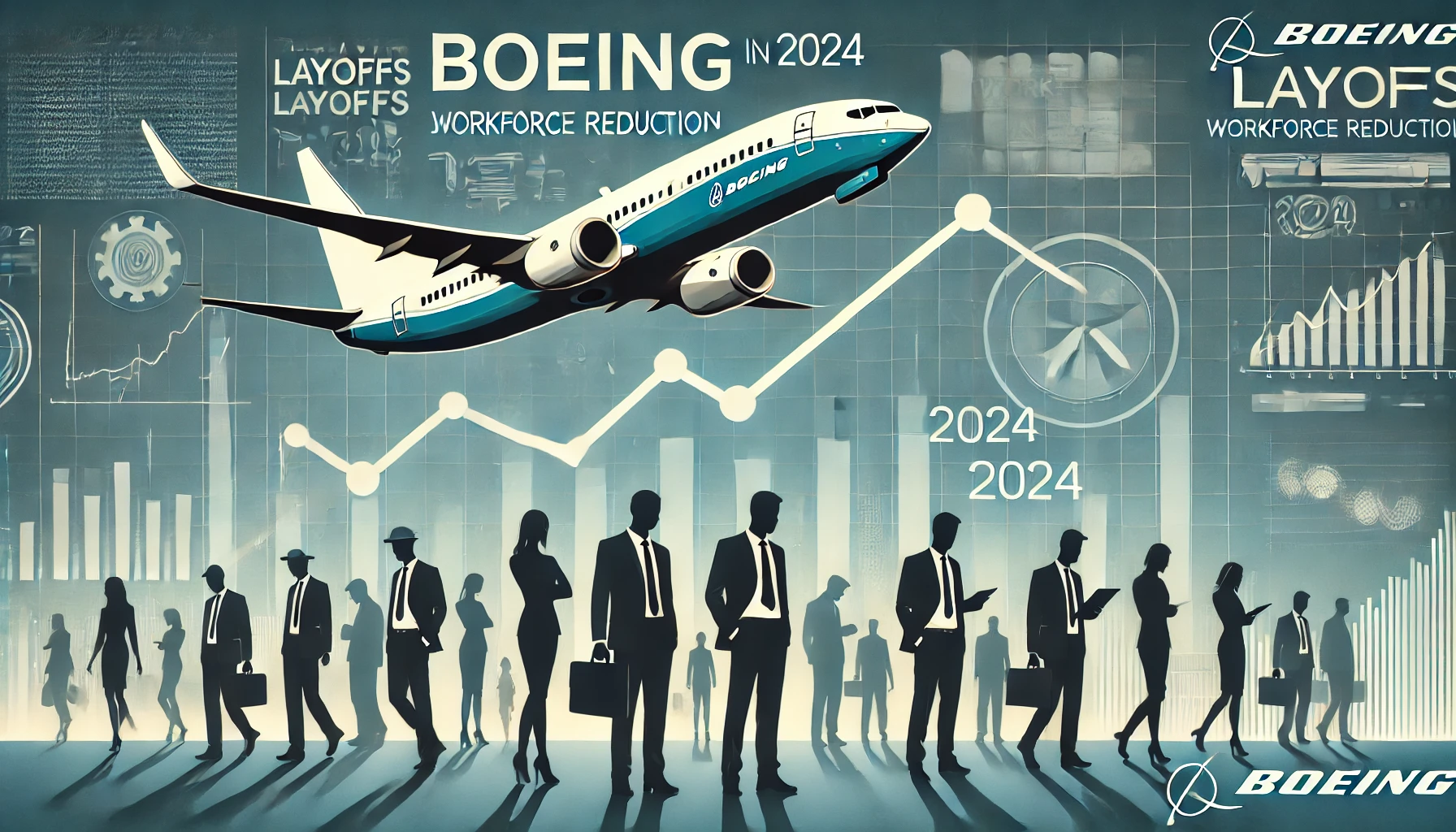Boeing Layoffs in 2024: What You Need to Know About Workforce Reductions and Job Cuts
In 2024, Boeing is facing another challenging chapter in its long history, with widespread Boeing layoffs affecting thousands of employees across its workforce. The aerospace giant has announced plans for deep cuts, especially in white-collar jobs, as part of a broader restructuring strategy. The Boeing job cuts come amid an evolving industry landscape, where the company is trying to adapt to new market conditions while balancing profitability and operational efficiency.
This blog will explore the details of Boeing layoffs, focusing on the company’s approach to reducing its workforce, the impact on white-collar jobs, and the broader consequences for the aerospace industry. Understanding these dynamics is crucial for current Boeing employees, industry analysts, and job seekers alike.
Boeing Layoffs: What’s Behind the Workforce Reduction?
Boeing has been no stranger to restructuring over the past few years, but the scale and focus of its current Boeing layoffs in 2024 have drawn particular attention. The company announced that the layoffs would primarily target white-collar job cuts, especially in administrative and managerial positions. This decision reflects a shift in Boeing’s strategy as it seeks to streamline operations and reduce costs.
The Reasons for Boeing Job Cuts in 2024
Several factors have contributed to Boeing’s decision to move forward with substantial job cuts:
- Post-Pandemic Recovery: The aerospace sector has struggled to recover from the impact of the COVID-19 pandemic. While travel demand has surged, companies like Boeing are still dealing with the financial strain caused by grounded fleets and reduced demand for new aircraft during the height of the pandemic.
- Shifts in Industry Demand: With an increasing focus on sustainable aviation and advanced manufacturing technologies, Boeing is realigning its workforce to meet these future demands. As a result, many traditional white-collar jobs have been deemed redundant.
- Cost-Cutting Measures: In an effort to remain competitive in a challenging market, Boeing has prioritized reducing operational costs. Unfortunately, this has translated into layoffs, particularly within corporate and administrative functions.
Boeing Layoff News: White-Collar Job Cuts Dominate Headlines
Much of the recent Boeing layoff news has centered on the deep cuts to its white-collar workforce. While layoffs in the manufacturing and production sectors have been relatively common during downturns in the aerospace industry, the focus on white-collar job cuts is a new development. This strategic shift suggests that Boeing is rethinking its corporate structure as it prepares for a future focused on innovation and efficiency.
White-Collar Job Cuts: Why This Time is Different
Historically, layoffs at Boeing have primarily affected factory workers and engineers when production lines slowed down. However, the 2024 layoffs are targeting administrative, managerial, and support roles—people who have traditionally been seen as less vulnerable during times of industry stress. The impact on Boeing white-collar jobs is a clear signal that the company is looking to do more with fewer resources in its corporate operations.
The Scope of White-Collar Job Losses
Boeing has yet to release an exact figure for how many white-collar jobs will be lost, but industry experts estimate that thousands of positions could be cut. These layoffs are expected to affect employees at Boeing’s U.S. headquarters and offices around the world. The deep cuts in corporate job layoffs reflect a growing trend in large corporations where companies are moving toward leaner operations to stay competitive.
Boeing Restructuring: A Necessary Move for the Future?
The layoffs are part of a broader Boeing restructuring plan aimed at preparing the company for the future. While these changes are painful for the employees affected, Boeing leadership argues that the restructuring is essential for the long-term health of the company. But what does Boeing restructuring entail, and why has it become necessary?
Boeing’s Plan for Future Growth
Boeing’s restructuring efforts are focused on several key areas:
- Digital Transformation: Boeing is investing heavily in digital tools and automation to increase efficiency and reduce reliance on manual processes. As part of this transformation, the company is reducing its need for certain white-collar jobs in administrative and support functions.
- Focus on Sustainability: The aerospace industry is under increasing pressure to reduce its environmental footprint. Boeing is positioning itself to lead in sustainable aviation by reallocating resources to research and development in this area, which has led to job cuts in non-critical sectors.
- Streamlining Operations: As the company looks to become more agile, it is eliminating positions that are seen as unnecessary or redundant in its future plans. This is particularly true for corporate roles, where workforce reduction has been focused on cutting layers of management.
Aerospace Job Layoffs: How the Industry is Affected
Boeing’s decision to cut jobs is not happening in isolation. The entire aerospace job market is experiencing fluctuations as companies restructure to adapt to new market realities. Aerospace job layoffs are becoming more common as firms look to reduce costs and focus on new technologies like electric aviation and autonomous flight.
How Boeing’s Layoffs Affect the Aerospace Industry
Boeing is one of the largest employers in the aerospace industry, and its layoffs are sending ripples through the entire sector. As aerospace job layoffs increase, smaller companies that rely on Boeing for contracts and partnerships may also face challenges. This could lead to a cascading effect, where other firms follow suit with their own workforce reductions.
The Future of Aerospace Jobs
Despite the challenges, the aerospace industry is still poised for long-term growth, particularly in areas like space exploration and sustainable aviation. For professionals impacted by Boeing’s job cuts, opportunities may arise in these emerging sectors. However, the industry is becoming more competitive, with a greater emphasis on specialized skills and advanced technology.
Corporate Job Layoffs: A Broader Trend
The corporate job layoffs at Boeing reflect a broader trend in various industries, where companies are reducing their white-collar workforce to cut costs and improve operational efficiency. In recent years, companies across sectors like finance, healthcare, and technology have implemented similar strategies, focusing layoffs on corporate roles rather than frontline workers.
Why Are Corporate Layoffs Increasing?
- Automation and Digitalization: As companies invest in automation and digital tools, the need for large administrative teams has decreased. Many corporate job layoffs are the result of businesses adopting technology that can perform tasks previously handled by human employees.
- Global Competition: Companies are also facing increased pressure from global competitors who operate with leaner, more efficient structures. In response, many firms are reducing their corporate workforce to stay competitive in the global market.
Boeing Employment: What’s Next for Workers?
As Boeing employment numbers shrink, many employees are wondering what comes next. For those directly affected by the layoffs, the company has offered severance packages and career transition services. However, the job market for aerospace professionals remains uncertain as the industry undergoes transformation.
Opportunities for Laid-Off Employees
Despite the layoffs, there are still opportunities for skilled workers in aerospace. As Boeing focuses on innovation, there is growing demand for talent in areas like engineering, digital technology, and sustainable aviation. Workers impacted by the Boeing layoffs may need to reskill or upskill to take advantage of these opportunities.
For resources on how to transition to a new career or acquire new skills, explore additional information from Regent Studies, which offers comprehensive guides on career growth and industry trends.
Boeing’s Workforce Reduction and the Future of Aerospace
The Boeing layoffs in 2024, particularly the white-collar job cuts, mark a significant turning point for the company and the broader aerospace industry. As Boeing restructures and reduces its workforce, the effects are being felt across the sector. The deep cuts to Boeing white-collar jobs reflect a shift in how large corporations are streamlining their operations to focus on future growth, digital transformation, and sustainability.
While the Boeing job cuts are challenging for those affected, they also highlight the need for adaptability in an evolving industry. As aerospace moves toward new technologies, the demand for highly skilled workers will continue to grow, offering opportunities for those willing to embrace change.
For more insights on industry trends and strategies for navigating corporate restructuring, be sure to visit Regent Studies.



